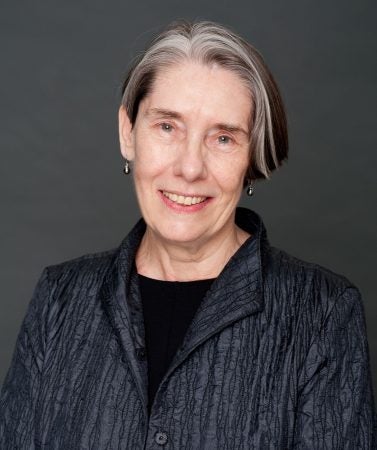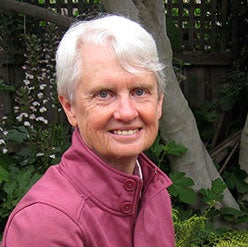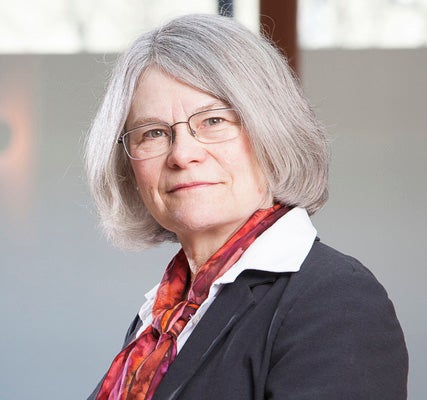The Humphrey Professorship in Feminist Philosophy is an endowed position that allows a visiting scholar in feminist philosophy to spend a semester in residence at the Philosophy Department every few years. Each Humphrey Professor offers a series of lectures, teaches a seminar, and mentors graduate and senior undergraduate students.
The Humphrey Professorship was established by Anne (Humphrey) Minas, Professor Emerita of the Department, through an inheritance from her father, Judge Alex Humphrey, and her grandfather, Judge Churchill Humphrey. Professor Minas made this donation in memory of her parents and grandparents, in gratitude to the University of Waterloo, where she taught from 1966 to 2002, and with the commitment to the flourishing of feminist philosophy at the University of Waterloo.
Humphrey Professor Alison Wylie: Winter 2024

Alison Wylie visited us from the University of British Columbia where she specializes in social and historical sciences; feminist philosophy of science; history and philosophy of archaeology; ethics issues in the social sciences. While at Waterloo she worked on feminist standpoint theory and collaborative research practice.
"Most fundamentally I’m curious about how inquiry succeeds under non-ideal conditions, and how we can best adjudicate the knowledge claims we rely on. My research is case-based, and focused on questions about the nature of evidence, ideals of objectivity, the role of values in science, and issues of accountability in science." — Alison Wylie
Previous visiting feminist philosophers, include:

Andrea Pitts (2021)
Andrea is Associate Professor of Philosophy at UNC Charlotte and is affiliate faculty of the university’s Department of Africana Studies, the Center for Holocaust, Genocide, and Human Rights Studies, the Latin American Studies Program, the School of Data Science, the Social Aspects of Health Initiative, and the Women’s and Gender Studies Program.
Their research interests include Latin American and U.S. Latinx philosophy, critical philosophy of race, feminist philosophy, and critical prison studies, and they have taught graduate and undergraduate courses on topics such as Latina/x feminist philosophy, queer migration studies, prison abolitionism, critical transgender politics, and feminist epistemology.
Andrea is the author of Nos/Otras: Gloria E. Anzaldúa, Multiplicitous Agency, and Resistance (SUNY Press 2021), and co-editor of Beyond Bergson: Examining Race and Colonialism through the Writings of Henri Bergson withMark Westmoreland(SUNY Press 2019) and Theories of the Flesh: Latinx and Latin American Feminisms, Transformation, and Resistance with Mariana Ortega and José M. Medina (Oxford University Press 2020). Andrea also co-organizes, along with Perry Zurn, the Trans Philosophy Project, a professional and research initiative dedicated to supporting trans, nonbinary, and gender variant philosophers.
Andrea is teaching the PHIL 422/673/675/GSJ 472 seminar this term on 'Health, Punishment, and Carceral Medicine.' The course examines the shifting functions of “health” and “punishment” within 19th and 20th-century Canadian and U.S. discourses of social order, modernization, and penology. The primary objective of the course is to familiarize students with the historical and contemporary relationships between health care and punishment industries and to demonstrate forms of politicized response to the uses of “health” and “punishment” as methods for normalization, exclusion, patterned neglect, and genocide.
Topics examined within the course include social hygiene movements, immigration policy and regulation, forced sterilization practices, Indigenous boarding/residential schools, the emergence of asylums and penitentiaries, environmental and medical racism, and the institutionalization of the field of correctional health care. The course will also examine responses to these issues by engaging the work of radical health care organizers, disability justice activists, the reproductive justice movement, prison abolitionists, and decolonial movements.

Heidi Grasswick (2017)
Heidi Grasswick earned her Ph.D. in Philosophy from the University of Minnesota. Originally from the west coast of Canada, she also holds a B.A. from the University of Victoria (Honors in Philosophy) and an M.A. (Philosophy) from Dalhousie University in Halifax, Nova Scotia. Her teaching interests include feminist philosophy, environmental philosophy, theory of knowledge, and issues of science and society. She also regularly contributes to the Women’s and Gender Studies curriculum at Middlebury through both cross-listed philosophy courses and senior seminars.
Professor Grasswick’s primary research areas are feminist epistemology, and social epistemology—examining the social aspects of knowledge production. Much of her writing concerns our responsibilities for knowledge-seeking and their connections with moral responsibilities. She has recently completed the volume Making the Case: Feminist and Critical Race Philosophers Engaging Case Studies, co-edited with Nancy McHugh. Her current research focuses on issues of trust between scientific (or expert) communities and lay communities, and responsibilities for the sharing of knowledge.
Course: Theorizing Power in Knowledge
Public lectures:
- "Epistemic Autonomy and Trust in a Social World of Knowing"
- "Trust, Science and Epistemic Injustice"
- "What's in a Name? Feminist Epistemology as Social Epistemology"

Anita Superson (2013)
Dr. Anita Superson is a professor at the University of Kentucky. She is a founding member of the Society for Analytical Feminism and served as President and as a member of the Executive Committee for over a decade. She also served on the APA Committee on the Status of Women and was a member of the Special Task Force on Women in Philosophy.
Dr. Superson specializes in ethics and feminist philosophy. Her interests in ethics are wide-ranging, including metaethics, moral psychology, normative ethics, and health care ethics with a particular interest in moral skepticism, moral authority or bindingness, internalism/externalism, responsibility, agency, deformed desires, social privilege, evil and immorality, and bodily autonomy. Much of her work intersects ethics and feminism.
Other issues she has examined in her published work include contractarian and feminist attempts to defeat moral skepticism, whether acting from moral motives is rationally required, the internalism/externalism debate about reasons and motivation, responsibility of the privileged for harm to the oppressed, responsibility of the Deferential Wife for her servility, victim-blaming, deformed desires and informed desire tests, the connection between the rationality of dispositions and of actions, the moral status of faculty/student amorous relationships, and sexual harassment.
She is currently working on papers on moral bindingness, fanhood as a commitment, and a monograph on bodily autonomy (followed by another on Feminist Ethics for the Cambridge University Elements series).
Course: Bodily Autonomy
Public lectures:
- “Moral Bindingness”
- “The Right to Bodily Autonomy and the Abortion Controversy”
- “Honky Tonk Women: The Right to Bodily Autonomy and Prostitution”

Ann Garry (2011)
Dr. Ann Garry’s primary research has been in Feminist Philosophy, including feminist approaches to epistemology and philosophical methods. Her works include “Women, Knowledge, and Reality: Explorations in Feminist Philosophy” (1996), “Transgender Studies and Feminism: Theory, Politics, and Gender Realities”, (2009) and “The Routledge Companion to Feminist Philosophy” (2017).
Dr. Garry was a full professor at California State Los Angeles from 1983-2006 and has served in several important administrative roles. She is also the founding director of the Centre for the Study of Genders and Sexualities, as well as an interim editor of Hypatia. Since retiring from Cal State LA, she has held appointments as a Visiting Scholar at various universities worldwide, including an appointment as Humphrey Chair of Feminist Philosophy here at Waterloo in 2011.
The Society for Women in Philosophy was started in 1972 to promote women within the field and has been bestowing the Distinguished Women in Philosophy award since the mid 1980s. Previous award winners include University of Waterloo philosophy professor, Jenny Saul, who was the recipient in 2011.
Course: Social Epistemology: Injustice and Epistemologies of Ignorance
Public lectures:
- “Who is Included? Intersectionality and the Multiplicity of Gender”
- “Metaphors of Intersectionality”
- “Why Distinguish Feminists’ Philosophical Methods? Values and Risks”

Lisa Schwartzman (2010)
Dr. Lisa Schwartzman is the author of Challenging Liberalism: Feminism as Political Critique (Penn State Press, 2006) and co-editor of Feminist Interventions in Ethics and Politics (Rowman and Littlefield, 2005). She has also published essays on feminist analyses of rights, equality, and hate speech. She is co-editing a special issue of the Journal of Social Philosophy on the topic “Gender, Implicit Bias, and Philosophical Methodology.”
Dr. Schwartzman’s current work focuses on two related projects: the first involves examining the role that choice and autonomy play in contemporary discussions of feminism, and the second involves a critical feminist analysis of philosophical methodologies.
Course: Feminism, Liberal Theory and Choice
Public lectures:
- “Feminism, Choice, and Freedom: The Limitations of Preference-Based Liberalism”
- “Autonomy and Feminism: Reframing the Debate”
- “Method, Ideal, or Ideology? A Feminist Examination of Rational Choice Theory”

Janna Thompson (2007)
Dr. Janna Thompson is an Adjunct Professor at La Trobe University. Her research focuses on political and moral philosophy. She believes that philosophy fulfils its real purpose outside of the academy when it is put to work identifying and criticising the assumptions embedded in political debates and searching for the values to guide us when we confront technological and social change.
Course: Communal Allegiances and Feminist Interventions
Public lectures:
- “Giving the Dead their Due: Justice and Past Generations”
- “Fair Play Between the Generations: Gratitude and Justice in a Multi-generational Society”
- “Sustainability and Duties to Future Generations”
Marilyn Frye (2004)
Dr. Marilyn Frye is the Associate Dean for Graduate Studies at the College of Arts and Letters. She is author of two books of essays in feminist theory: The Politics of Reality (1983) and Willful Virgin (1992), both published by The Crossing Press. Since then she has been working to understand what the category WOMEN is, and what social categories generally are.
Course: Feminists Theorizing Bodies
Public lectures:
- “Ignorant Agency: On Not Knowing What You’re Doing”
- “Category Trouble: Helping Feminist Theory Out of a Bind”

Christine Overall (2003)
Dr. Christine Overall is a Professor Emerita of Philosophy and holds a University Research Chair at Queen’s University in Kingston Ontario. Her research and publications are in the following areas:
- feminist philosophy (especially questions about gender, sex, sexuality, disability, age, and socioeconomic class);
- applied ethics and bioethics (especially questions in procreative ethics and social policy, and questions about aging, death, and longevity);
- contemporary analytic philosophy of religion.
She is the editor or co-editor of five books and the author of six.
Course: Sex and Gender
Public lectures:
- “Ethics and Increasing Human Longevity”
If you have questions about the Humphrey Professorship, or about supporting philosophy at Waterloo financially, contact Mathieu Doucet, Chair of the Department.